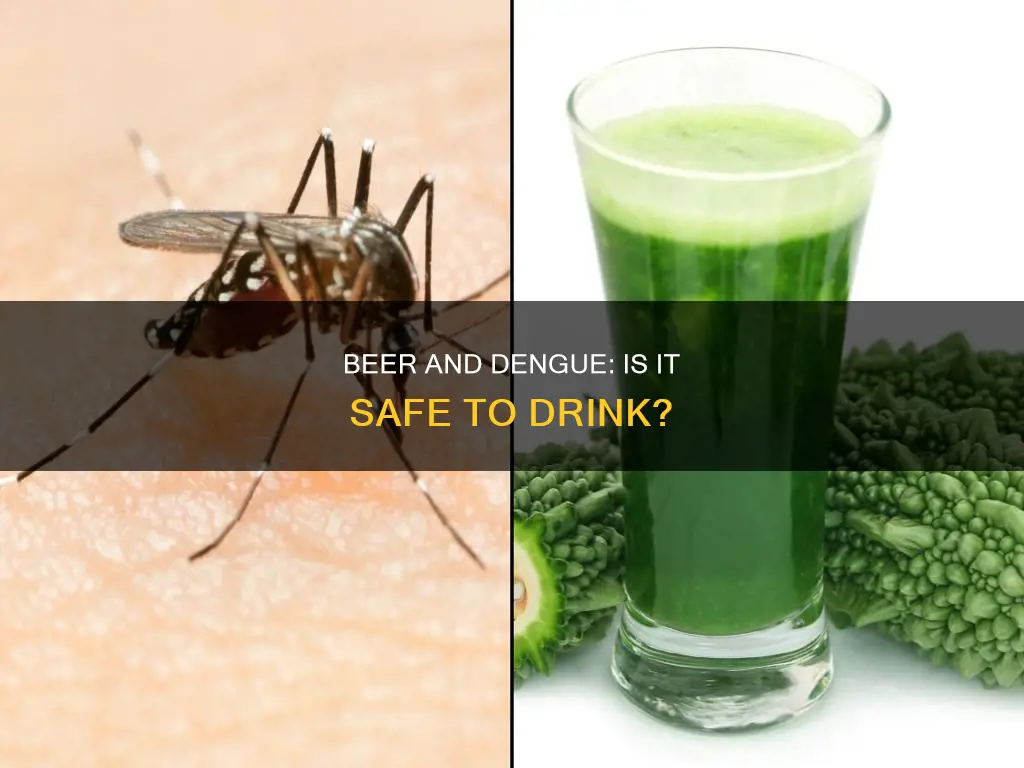
Dengue fever is a viral infection that can lead to serious health complications, including acute liver failure. While recovering from dengue fever, it is important to refrain from consuming alcohol, including beer, as it can negatively impact liver function and worsen the disease. Alcohol intake can induce mitochondrial toxicity in hepatocytes, affecting their metabolizing capacity and potentially leading to acute liver failure. Therefore, it is recommended to avoid drinking beer or any other form of alcohol during and after dengue fever to ensure a safe and full recovery.
What You'll Learn

Alcohol and dengue can cause acute liver failure
Alcohol intake, both regular and binge drinking, can induce mitochondrial toxicity in hepatocytes, affecting their metabolizing capacity. Binge drinking can also induce bacterial translocation from the gut, triggering activation of Kupffer cells. The presence of bacterial translocation combined with dengue virus infection could induce a hyperactivation of Kupffer cells, leading to a significant worsening of the disease.
Individuals with chronic alcohol intake could also have unrecognized chronic liver disease, which can worsen with a viral infection like dengue, leading to acute-on-chronic liver failure. This condition has a poor prognosis and requires a different treatment approach than acute liver failure.
In addition, alcohol consumption and abuse are no longer considered solely "western" habits but are now common in tropical countries, where dengue is endemic. This further highlights the potential impact of alcohol intake on liver function and immune response in individuals with dengue.
Therefore, evaluating alcohol intake is critical when addressing liver-related diseases, especially in the case of acute hepatitis or liver failure from dengue infection. By understanding the role of alcohol in liver failure, we can identify potential points of prevention and improve patient outcomes.
Drinking Beer While Driving in California: What's Allowed?
You may want to see also

Dengue patients should refrain from alcohol
Dengue patients should refrain from consuming alcohol. Alcohol can deteriorate a dengue patient's condition in several ways. Firstly, dengue targets hepatocytes and Kupffer cells, which are responsible for metabolizing toxins in the body. Consuming alcohol can induce mitochondrial toxicity in these cells, affecting their ability to function properly. This can lead to acute liver failure, a rare but catastrophic complication of dengue infection.
Secondly, binge drinking can induce bacterial translocation from the gut, triggering the activation of Kupffer cells. The combination of bacterial translocation and dengue virus infection could lead to hyperactivation of these cells, resulting in a significant worsening of the disease. Thirdly, individuals with a history of chronic alcohol intake may have underlying chronic liver disease, which can suddenly deteriorate upon dengue infection, leading to acute-on-chronic liver failure. This condition has a poor prognosis and requires a specific treatment approach.
Additionally, alcohol consumption can negatively impact the immune response, making it more difficult for the body to fight off the dengue infection. Alcohol can also interfere with the absorption of certain nutrients, which are crucial for the body's recovery process. Therefore, it is essential for dengue patients to refrain from consuming alcohol during their recovery period. Patients should also avoid physical activities or exercise, opting for rest and easily digestible, nutritious foods instead. Maintaining adequate hydration by drinking plenty of water and consuming fresh fruits is also recommended during the height of the infection.
In conclusion, dengue patients must refrain from alcohol consumption to prevent further complications and ensure a smooth recovery. It is important to follow the advice of medical professionals and prioritize rest and proper nutrition during the recovery process.
Beer Ads: Drinking on the Job?
You may want to see also

Alcohol can deteriorate a dengue patient's condition
Dengue fever is a mosquito-borne illness that is usually mild but can sometimes lead to severe and life-threatening complications. While most people recover from dengue fever without any lasting issues, alcohol consumption can potentially deteriorate a patient's condition and lead to more severe outcomes. Here are several reasons why alcohol can have a detrimental impact on dengue patients:
- Liver complications: Dengue fever can, in rare cases, lead to acute liver failure, a serious and often fatal condition. Alcohol intake, especially chronic and binge drinking, can induce mitochondrial toxicity in hepatocytes (liver cells), affecting their ability to function properly. This toxicity, combined with the damage caused by the dengue virus, could result in a significant worsening of the disease.
- Bacterial translocation and hyperactivation of Kupffer cells: Binge drinking has been associated with an increase in bacterial translocation from the gut. This, in combination with the dengue virus infection, could lead to hyperactivation of Kupffer cells, which are important targets for the virus. Hyperactivation of these cells could further exacerbate the disease state.
- Unrecognized chronic liver disease: Individuals with a history of chronic alcohol consumption may have underlying chronic liver disease that goes undetected. The development of a viral infection on top of this can lead to acute-on-chronic liver failure, which carries a poor prognosis and requires a different treatment approach compared to acute liver failure.
- Immune response and liver function: Alcohol consumption, particularly in tropical countries where dengue is prevalent, can negatively impact the innate immune response and liver function. This could make it more difficult for the body to fight off the dengue virus and increase the risk of severe complications.
In conclusion, alcohol consumption can have detrimental effects on dengue patients, potentially worsening their condition and leading to more severe outcomes. It is important for healthcare providers to evaluate alcohol intake when addressing dengue-related liver complications and for patients to refrain from alcohol consumption during and after recovery from dengue fever.
Mixing Beer and Nyquil: Safe or Risky?
You may want to see also

Alcohol should be avoided during the height of infection
Alcohol should be avoided during the height of a dengue fever infection. Dengue fever can cause acute liver failure, a rare but catastrophic event that is poorly understood. Alcohol intake, especially in binge-drinking, induces mitochondrial toxicity in hepatocytes, affecting their metabolizing capacity. This can lead to acute hepatitis or liver failure, which has a poor prognosis and requires a differential therapeutic approach.
Additionally, binge drinking induces bacterial translocation from the gut, which usually triggers the activation of Kupffer cells. The presence of bacterial translocation combined with the dengue virus infection could induce a hyperactivation of Kupffer cells, resulting in a significant worsening of the disease.
Alcohol consumption can also have a deleterious effect on liver function and the innate immune response. This can further compromise the body's ability to fight off the dengue virus infection and may lead to more severe complications.
Therefore, it is strongly advised to refrain from consuming alcohol during the height of a dengue infection to prevent further deterioration of one's condition and to give the body the best chance of recovery.
Beer and Pregnancy: Is It Safe to Drink?
You may want to see also

Alcohol can induce bacterial translocation from the gut
Alcohol can cause an overgrowth of gastrointestinal microbiota, which can lead to an increase in the release of endotoxins. This, in turn, can activate proteins and immune cells that promote inflammation.
In addition, alcohol can alter the composition of the gut microbiota, leading to an imbalance between "good" and pathogenic bacteria. This dysbiosis can further contribute to inflammation and a disruption of the intestinal barrier, allowing bacteria and toxins to enter the bloodstream and affect other organs.
The specific mechanisms by which alcohol induces bacterial translocation include:
- Altering intestinal microbiota composition and function
- Increasing the permeability of the intestinal lining
- Affecting the intestinal immune homeostasis
Furthermore, alcohol intake can also have indirect effects on bacterial translocation by causing liver damage, which can further exacerbate the issue.
Overall, the induction of bacterial translocation by alcohol consumption can have significant negative consequences on the body, and it is important to consider these risks when drinking alcohol, especially for those with pre-existing health conditions.
Beer Drinking at Dana Point: What You Need to Know
You may want to see also
Frequently asked questions
No, alcohol should be avoided when you have dengue fever. It can deteriorate your condition in many ways.
Alcohol induces mitochondrial toxicity in hepatocytes, affecting their metabolizing capacity. Binge drinking can also induce bacterial translocation from the gut, which triggers activation of Kupffer cells. The presence of bacterial translocation combined with dengue virus infection could induce a hyperactivation of Kupffer cells, with a significant worsening of the disease.
Acute liver failure secondary to dengue virus infection is a rare but catastrophic event. Evaluating alcohol intake is critical when addressing liver-related diseases.
Drink a lot of water and consume fresh fruits.







